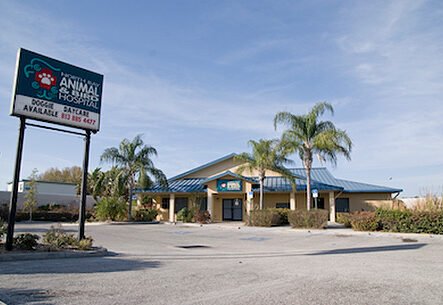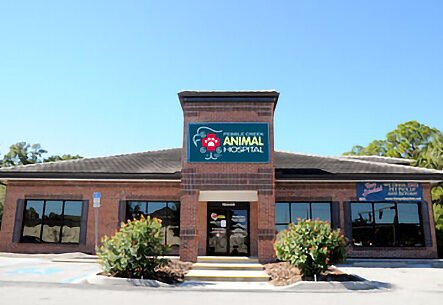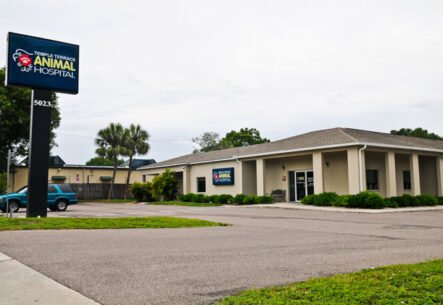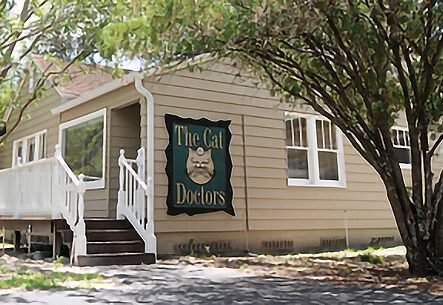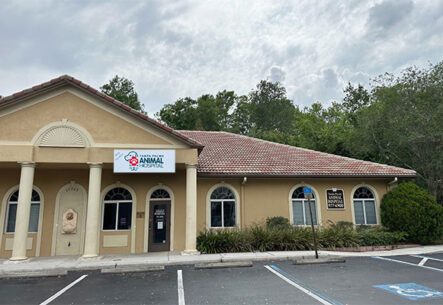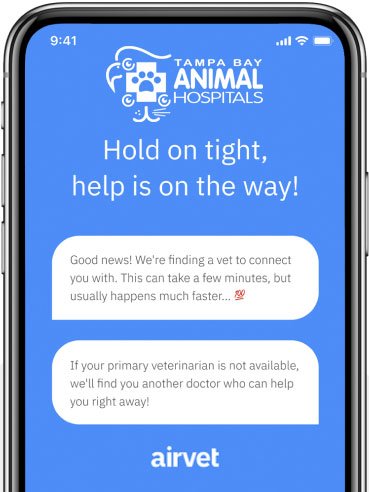Heartworm Disease in Dogs
WHAT IS HEARTWORM DISEASE?
Canine heartworm disease develops when a dog is bitten by a mosquito carrying microscopic heartworm larvae (juvenile worms) of a parasite called Dirofilaria immitis. As a mosquito feeds, these microscopic larvae are deposited on the dog and quickly penetrate the skin to begin their migration into the dog’s bloodstream. Adult heartworms can grow 10 to 12 inches in length and make their home in the right side of the heart and pulmonary (lung) arteries, often causing lung disease and heart failure.
Adult heartworms can grow 10 to 12 inches in length.
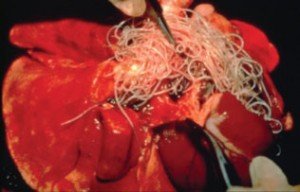 Although easy to prevent, heartworm disease continues to be a major health problem for dogs living in the United States and throughout the temperate and tropical regions of the world.
Although easy to prevent, heartworm disease continues to be a major health problem for dogs living in the United States and throughout the temperate and tropical regions of the world.
SIGNS OF HEARTWORM DISEASE
Since some dogs can be infected for many years before symptoms develop, heartworm disease in dogs may not be obvious. But, as heartworms slowly cause damage to the pulmonary arteries of the lungs, signs of disease may include a mild persistent cough, reluctance to exercise, fatigue after moderate activity, decreased appetite, and weight loss. Eventually, as blood flow through the diseased lungs becomes more restricted, some dogs can develop heart failure. This is commonly recognized by a buildup of fluid in the abdomen and the appearance of a “swollen belly.”
Although less common, a large number of heartworms can lead to a sudden obstruction of blood flow through the heart and lungs. This blockage often becomes a life-threatening form of cardiovascular collapse and is referred to as “caval syndrome.” Symptoms of caval syndrome often include a sudden onset of labored breathing, pale gums, dark red or “coffee-colored” urine, and an inability or unwillingness to move. Without prompt surgical removal of the heartworm blockage, few dogs suffering from caval syndrome survive.
DETECTING HEARTWORM INFECTION
Numerous blood tests are available for detecting heartworm infections in dogs, and your veterinarian will perform the test most appropriate for your dog. Keep in mind that no diagnostic test can accurately detect all heartworm infections. Tests cannot consistently detect infection until heartworms are at least seven months old. Moreover, tests are unable to detect infections if only male worms are present or if there are only one or two female worms. At times, your veterinarian may recommend the use of X-ray or ultrasound imaging to help in the diagnosis of heartworm disease. They may also repeat the blood test at suggested intervals.
WHO SHOULD BE TESTED?
Annual testing is recommended for monitoring the success of any heartworm prevention program. Sometimes, individual risk factors, clinical signs, preventive changes and testing limitations might warrant more frequent testing.
The frequency of testing should be discussed with your veterinarian, but all dogs more than six months of age should be tested for heartworms prior to initiating a preventive program. At a minimum, retesting is recommended six months following initiation of preventive or any lapse in administration, and annually thereafter.
TREATMENT
There are several things to consider once a dog is diagnosed with heartworm disease. Without treatment, heartworm disease will worsen and may lead to more serious illness. Unless medical reasons identify a dog as a poor candidate, heartworm-positive dogs should be treated. However, treating dogs for heartworms can also lead to serious health concerns, as these dead parasites may cause further injury to the lungs and pulmonary arteries.
A thorough physical examination, radiographs, and blood and urine tests may be needed prior to treatment to assess your dog’s level of risk. To reduce complications, your veterinarian will educate you in great detail before beginning treatment.
While the heartworm medication melarsamine hydrochloride is extremely effective in eliminating adult worms, some dogs will not be completely cleared with a single course of treatment. Testing is recommended six months after treatment to ensure all heartworms were killed. If tests are positive, additional adulticidal treatment may be indicated.
PREVENTION
Heartworm preventives are effective when given properly and on a timely schedule. It is important to note that these medications are quickly eliminated from a dog’s body shortly after they are given and do not continue to protect dogs from future infection. Instead, they eliminate infections acquired since the last dose.
All approved heartworm preventives are highly effective, safe, easy to use, relatively inexpensive, and often provide treatment for additional parasites. Prevention is always more safe and affordable than treating dogs with adult heartworm infections.
Please remember, it is your responsibility to faithfully maintain the program you have selected in consultation with your veterinarian. The best way to eliminate the risk of heartworm infection in your dog is to institute a year-round prevention program.
Be certain to have all pets tested prior to initiating or restarting any heartworm prevention program, as administration of some preventives can cause life-threatening reactions when given to heartworm-infected pets.
HEARTWORM LIFE CYCLE
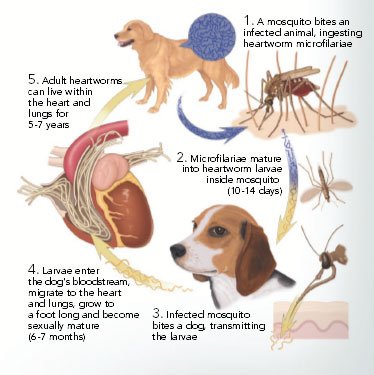 When a dog or other suitable host has a mature heartworm infection, female worms release their young (microfilariae) directly into the animal’s bloodstream. When a susceptible mosquito bites an animal with microfilariae in the blood, it ingests the microfilariae along with the blood. Over the following 10 to 14 days, these microfilariae develop and mature into infective larvae inside the mosquito. When the mosquito bites another dog, the larvae are left behind to enter the fresh wound.
When a dog or other suitable host has a mature heartworm infection, female worms release their young (microfilariae) directly into the animal’s bloodstream. When a susceptible mosquito bites an animal with microfilariae in the blood, it ingests the microfilariae along with the blood. Over the following 10 to 14 days, these microfilariae develop and mature into infective larvae inside the mosquito. When the mosquito bites another dog, the larvae are left behind to enter the fresh wound.
In six to seven months, these microscopic larvae grow to a foot long during their migration to the heart and lung arteries. The larvae also become sexually mature and produce microfilariae of their own, which are available in the dog’s blood to other mosquitoes.
Because heartworms may live for five to seven years in the dog, each mosquito season can lead to an ever-increasing number of worms in unprotected dogs. Microfilariae cannot develop into adult heartworms in our dogs without first developing into the infective stage within a mosquito.
A MESSAGE TO TAKE TO HEART
While the risk of infection in dogs varies from one region of the country to another and even from one community to another, one fact remains: heartworm disease is a threat to unprotected dogs in every state except Alaska. Unprotected dogs, foxes, coyotes, and wolves act as reservoirs, or sources, for the spread of this serious disease. The relocation of dogs, as with humanitarian efforts following natural disasters, can introduce heartworm disease to non endemic parts of the country. Alternately, unprotected dogs traveling with owners to high-incidence areas will be at risk for exposure. Since heartworm disease is a complicated illness, the best approach is prevention.
This article highlights many general aspects of heartworm disease but cannot address every detail. Comprehensive guidelines have been prepared to assist you and your veterinarian in providing the most up-to-date heartworm information. Please visit the website of the American Heartworm Society (www.heartwormsociety.org) for more in-depth information regarding prevention, diagnosis, and treatment of heartworm disease.
Tampa, FL 33615 (View map)
Tampa, FL 33647 (View map)
Tampa, FL 33617 (View map)
Tampa, FL 33647 (View map)
